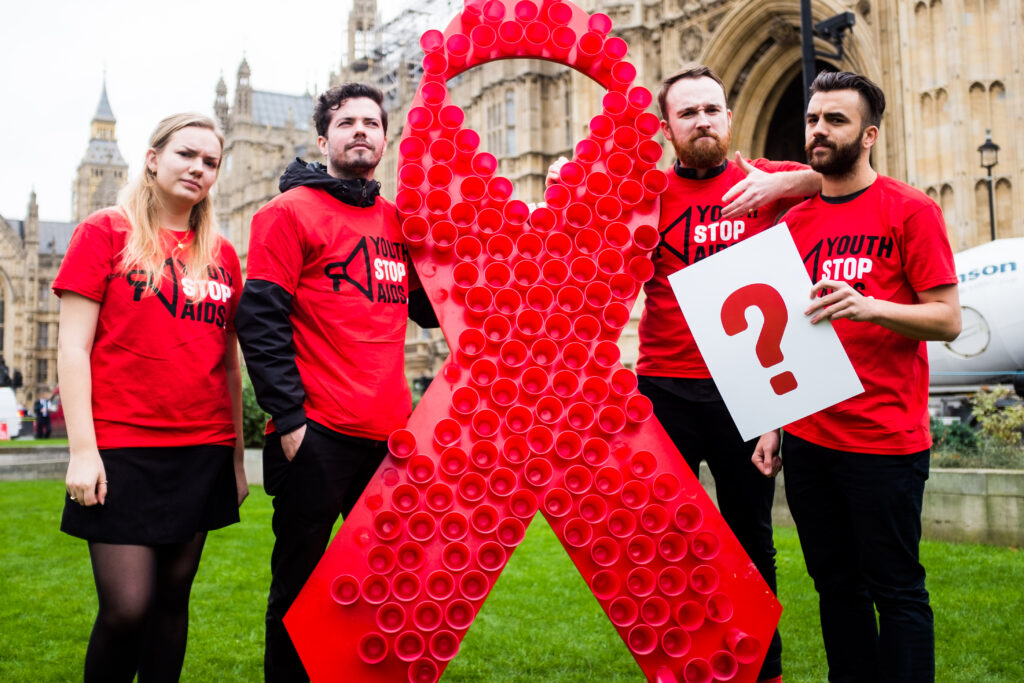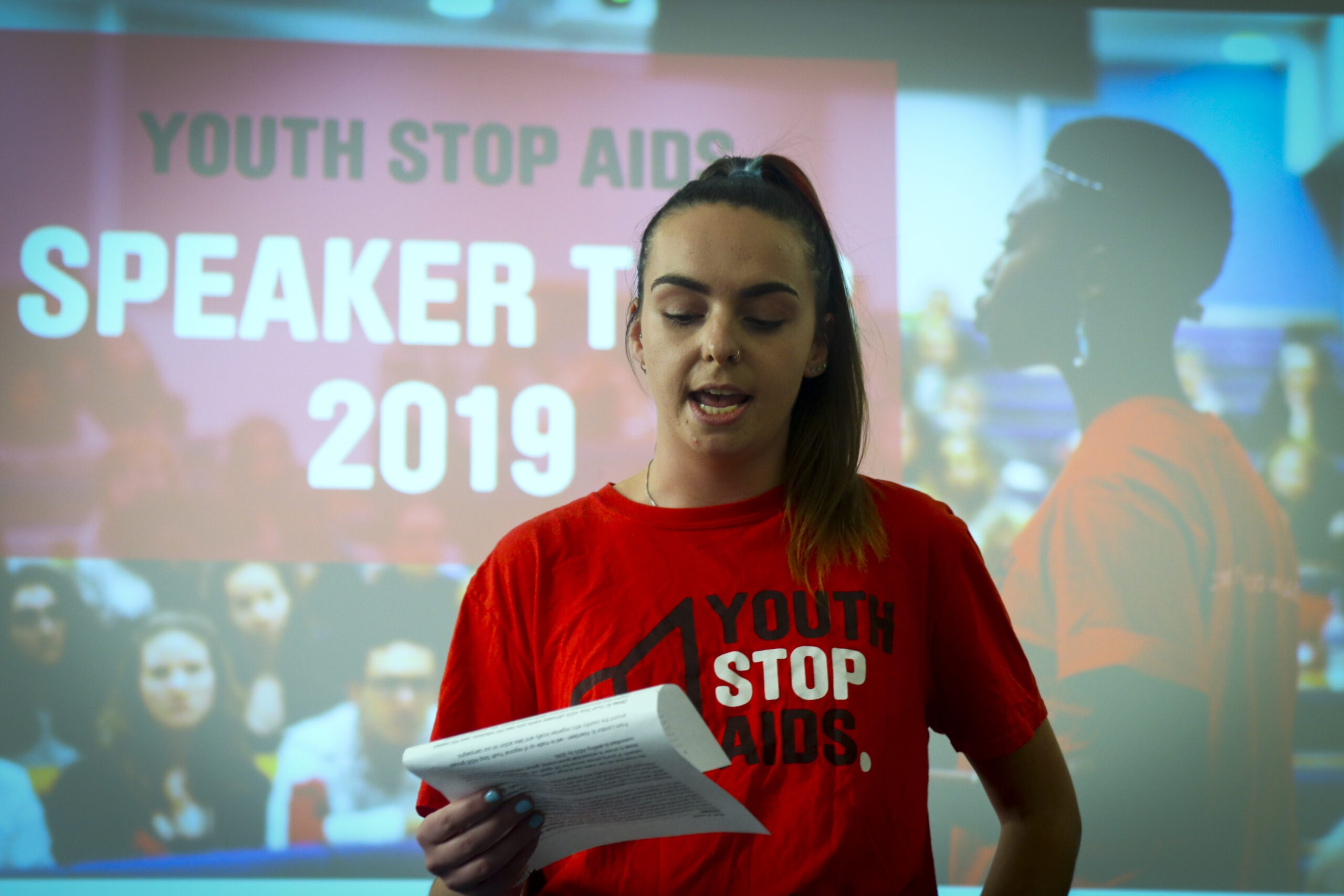“I didn’t know much about HIV or AIDS.
Growing up in a relatively secluded area in the Highlands in the North of Scotland, the only time I heard the words “HIV” or “AIDS” was when they were discussed in the back of a Modern Studies classroom.
The two words were usually followed by a brief statistic, highlighting them as an issue in Africa, or to gay men globally in the 80s.
In Scotland, HIV is not a compulsory topic; meaning teachers can choose whether or not to dedicate a lesson to it in PSE (Personal and Social Education). My teacher chose not to – so by the time I left school, my understanding of HIV was that it only really affected people of specific regions or sexualities. I was completely ignorant, with no knowledge on what the difference between HIV and AIDS even was, and a lack of understanding to the stigma I was potentially adding to.

In 2016, I worked on the International Citizen Service (ICS) programme with Restless Development in Uganda. During my time there, I began to realise that there were huge gaps in my sexual and reproductive health and rights knowledge.
I learnt not only how much of a problem HIV was in the communities I worked with in Uganda, but also how many people were actually living with HIV back here in the UK.
People living with HIV in the UK are in a much better position, with access to free drugs and a variety of services and groups offering support. In fact, 97% of people living in the UK who are HIV positive now have an undetectable viral load – meaning that due to medication, they cannot actually ‘pass on’ HIV to another individual (Terrence Higgins Trust). Undetectable = Untransmittable. Today, we can see statistics of people who are diagnosed with HIV at an early stage having the same life expectancy as the general population. This is fantastic progress!
If there’s so much progress, what’s the issue?
Stigma around HIV still exists. Based on many conversations I’ve had, people are still as ignorant as I used to be because there is a lack of education around the issue. There are many myths surrounding the virus and most people still don’t think it can affect them: “that’s not my problem, it isn’t relative to my life”. Wrong.
Anyone – despite ethnicity, location, gender or sexual identity – can be at risk of contracting HIV.
The statistics that were mentioned earlier are relevant for people who know their HIV status. However, there are still people living in the UK who do not know that they are HIV positive. Being unaware of your status not only impacts your own health, but also leaves future sexual partners at risk too. With our knowledge and available treatment here in the UK, there is no reason why anyone should be unaware of their status and not have access to treatment and support. HIV tests are quick and the service is free from sexual health clinics – so, know your status.
“I know my status”
Great! But there is still more progress to be made.
We know that stigma around the virus is still very much in existence. It’s important that we work towards living in a world that has zero discrimination towards people living with HIV, and continue to share up to date and relevant information with anyone that we can.
We also know that on a global scale, the story is much different. Depending on where you are in the world, you may not benefit from the same opportunities to access affordable medication and support, or be able to speak openly about experiences of living with HIV.
This means that there is still a lot of work to carry out if we are to meet the goal of ending AIDS by 2030; and regardless of your status, we all have a pivotal role to play in meeting that goal. There are so many inspiring individuals who share their personal experiences of living with HIV, and anyone who has the chance to listen will agree that hearing them talk is extremely powerful and moving. But even if you don’t have a personal experience of HIV, you can still contribute to the campaign to end AIDS! This is everyone’s problem and everyone’s responsibility.

So, what did you do?
There are numerous organisations that not only offer HIV services and support, but also opportunities to get involved in bringing about change.
I came across Youth Stop AIDS upon my return from Uganda, who not only brought me up to date with important knowledge, but provided the opportunity for me to get involved in HIV campaigning back here in the UK. In the 4 years that I have volunteered with Youth Stop AIDS, I have set up and grown a campaign group in Glasgow and worked on both national campaigns and individual projects.

Youth Stop AIDS supplies the guidance and resources that allows campaigners to explore relevant issues that are important to them or their communities. With a network of active and engaged campaigners around the UK, advice and support is always on offer to help with any campaign.
Since becoming a campaigner, I have had numerous opportunities to meet with MPs, fundraise in creative ways, host informative events such as our Speaker Tour, meet with DFID representatives, and guest speak at other events on behalf of Youth Stop AIDS. I have done this not only for UK wide campaigns, but also on individual projects that I felt were important to focus on within my community. These have included working with drug support services to discuss the closure of needle exchange centres and HIV prevalence rates; launching school surveys to highlight lack of HIV education; working with local drag queens and entertainers to raise awareness on social media; and working with government youth councils to propose that HIV becomes a compulsory topic within the Scottish school curriculum.
The list of potential opportunities to get involved is endless – plus, every year we hold large events such as our Big Weekend and Day of Action, where all campaigners from around the UK meet to learn, discuss and take action.
What can you do?
If you too feel inspired to get involved with Youth Stop AIDS, or are simply interested in finding out more, all you need to do is get in touch by visiting youthstopaids.org! You will be given full support in joining an established group, or more information on how to set-up a group in your area or become an individual campaigner.
Currently, the two main national Youth Stop AIDS focus areas are:
- It Ain’t Over: exploring ways we can keep the pressure on governments who have taken their eye off the ball. HIV is no longer a death sentence, but we need to keep up the funding and hard work to ensure we can continue to provide the needed services. AIDS can be ended by 2030 with the right actions taken.
- Missing Medicines: some people across the world don’t have access to the correct drugs due to pricing and missing medicines. The system is failing, and a lot of pharmaceutical companies prioritise MASSIVE profits over getting drugs to those who need them. Right now, only 52% of children globally living with HIV have access to treatment. We campaign on ways to change this because we believe everyone has the right to access medication.
However, due to the current circumstances we are also focusing on the ways in which Covid-19 is affecting young people living with HIV, as it is crucial that services and support are still provided despite the difficulties that are being experienced globally. Additionally, different groups and individual campaigners can work on relevant areas that they have a particular interest or passion for (e.g. HIV education or HIV prevalence rates among substance users).
AIDS can be ended by 2030 if we keep our eye on the ball and all continue to work hard.
Interested in Youth Stop AIDS?
Find out more about the Youth Stop AIDS campaign, and how to get involved
Find out more


